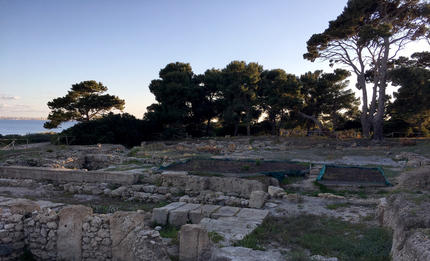New scientific study indicates genetic continuity in the Levant
A study conducted by scientists at the Wellcome Trust Sanger Institute, LAU and their collaborators links present-day Lebanese to Bronze Age Canaanites.
A most recent whole-genome study, conducted by scientists at Wellcome Trust Sanger Institute in the U.K.—one of the world’s leading institutes—LAU and their collaborators may have unlocked the mystery of our ancestry, establishing a direct link between Bronze Age Canaanites and present-day Lebanese. A report of the findings, co-authored by LAU’s Geneticist and Dean of Graduate Studies and Research Pierre Zalloua, was published today in The American Journal of Human Genetics under the title “Continuity and admixture in the last five millennia of Levantine history from ancient Canaanite and present-day Lebanese genome sequences.”
“It is not an easy task to construct the past using genes alone, a collaborative effort that includes historians, archeologists, anthropologists and climatologist is needed,” Zalloua says of the inter-disciplinary collaboration that is fundamental to this type of research.
The origins and fate of the Canaanites, later known to the ancient Greeks as Phoenicians, have long been subject to scientific debate due to the scarcity of historical records. While their cultural and political influences have been recognized, and references made to them in the Bible as well as ancient Greek and Egyptian texts, experts have been unable to determine conclusively their ancestry and link to descendants.
In this pioneering study, the scientists sequenced whole genomes of five Canaanite individuals who lived 4,000 years ago in Sidon, a major Canaanite city-state. They also sequenced the genomes of 99 Lebanese, and analyzed the genetic relationship between ancient Canaanites and modern-day Lebanese. The results indicated that Bronze Age Canaanite-related ancestry was widespread in the region, particularly in Sidon and Jordan.
Furthermore, DNA analysis suggested that more than 90 percent of present-day Lebanese descended from the Canaanites—themselves an admixture of local Neolithic populations and eastern migrants—and only a small proportion from Eurasians. The latter, it is believed, only arrived in the region around 3,750-2,170 years ago.
What the findings imply is significant genetic continuity in the Levant since the Bronze Age.
Zalloua explains that “the study provides additional support to the notion that people do not move unless there is a compelling reason for them to do so. The Levant has provided its inhabitants with an ideal environment since the Last Glacial Period: fair climate, and plenty of food and water, so there was no reason for people to leave. If you ask the modern-day Lebanese about their country, despite all the social and political problems they might have faced, they will tell you that they love their land. They have been occupying it for millennia.”
The geneticist, who has been researching Levantine history for 10 years, remarked on its complexity, given that “it is the oldest,” and its direct bearing on the present.
The first ever cultures arose in the Levant and Mesopotamia in 4,000 B.C.E., he said, with some evolving, others fading and new ones appearing, and “it is through a comprehensive understanding of these past cultures that we get to appreciate our heritage and, of course, the country we live in.”
More
Latest Stories
- LAU Family Medicine Graduates to Benefit from a Partnership With Nova Scotia
- AKSOB Assistant Professor Shares Her Vision for the Future of Learning
- LAU Simulation Models Celebrate 20 Years of Learning, Leadership and Service
- The School of Engineering Hosts the Lebanese Electromagnetics Day
- LAU Stands Out on the Sustainability Scores
- Michael Haddad Walks Again for Climate Change and Food Security
- AI in Clinical Practice: Tools, Ethics, and the Human Touch
- Interior Design Students Honor the Past by Designing the Future


